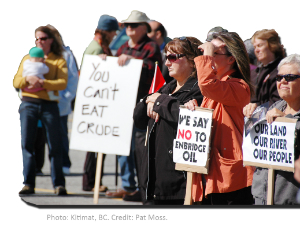
On Earth Day (April 22nd) we joined many other environmental organizations in applauding Adrian Dix and the NDP for standing up for our coast, and expressing opposition to the expansion of the KinderMorgan Pipeline. We were pleased to see similar language in the NDP’s platform, released shortly therafter:
[I]n regards to the proposed Kinder Morgan pipeline expansion, we do not believe the Port of Vancouver should be converted into a major oil export facility.

Until Mr. Dix’s announcement, the NDP was solidly against the Enbridge pipeline and tankers project, but had not taken a position on the Kinder Morgan pipeline (which it promised to subject to a more rigorous environmental assessment process). Although the NDP’s position is a bit less precise than the BC Green platform (which pledges to “Reject any expansion of the Kinder-Morgan pipeline from Alberta to Vancouver“), it is a clear indication of where the party stands.
Meanwhile, the BC Liberal Platform reiterates Premier Clark’s insistence that conditions need to be met before either pipeline should be allowed to proceed. The BC Conservative platform seems not to mention either pipeline, although the party is on record as supporting both pipelines.
This issue of new tar sands pipelines in BC is widely perceived to be an area of federal jurisdiction – meaning that the federal government holds the trump cards. The Tyee suggested that Dix is essentially campaigning, on this issue, against the federal government. So it’s important to explain why the Enbridge and Kinder Morgan Pipelines do have a provincial dimension, and what the significance of a provincial government saying no to one or both pipelines, and to tanker traffic, might mean. The question has both political and legal dimensions.
A legal point
It is true that trans-provincial pipelines, ports and tanker traffic are all matters of federal jurisdiction. It has been suggested that this provides the federal government with the final say on the Enbridge Pipeline. While this is not necessarily false, it is important not to overstate federal powers, or understate provincial powers, in relation to the values impacted by the pipelines.
Pipelines and tankers projects have an impact on a range of areas of provincial power and responsibility, as well as on lands and environmental resources ‘owned’ by the province. The province has a power, and indeed, a responsibility, to protect the province’s natural environment and resources, and can consequently regulate the impacts of pipelines in these areas.
In particular, the province has law-making powers (and already has laws) in relation to:
- the creation and management of provincial Crown Lands (across which both pipelines travel), including the foreshore and submerged lands on which port structures might be built;
- management of risks to water and especially laws related to work in and around streams (section 9 of the Water Act);
- actual and potential impacts on provincially ‘owned’ fish and wildlife;
- liability and injunctive relief related to potential oil spills (property and civil rights); and
- environmental assessment of projects that require a provincial government decision and/or which may impact the environment in BC.
Federal “paramountcy” and Pipelines
There was a time when the courts seemed to accept that certain federally regulated “undertakings” had “inter-jurisdictional immunity,” meaning that provincial regulations would not apply in respect of these projects. However, in recent years the courts have narrowed that approach, to the point that it is now the exception, rather than the rule.
Rather, the courts increasingly recognize that federal and provincial laws may at once apply to the same project. Thus, in the 2007 Supreme Court of Canada decision in LaFarge v. Vancouver, the Vancouver Port Authority, and the lands it regulates, were held not to be immune to provincial laws (in that case the bylaws of the City of Vancouver).
…[T]he doctrine [of interjurisdictional immunity] should not be used where, as here, the legislative subject matter (waterfront development) presents a double aspect. Both federal and provincial authorities have a compelling interest. Were there to be no valid federal land use planning controls applicable to the site, federalism does not require (nor, in the circumstances, should it tolerate) a regulatory vacuum, which would be the consequence of interjurisdictional immunity. …
That is not to say that the federal government cannot trump the provincial (or City of Vancouver) laws. In that case, the Vancouver Port Authority had enacted its own land use rules which were held to be “paramount” over the City of Vancouver’s land use bylaws. But it is only because there was held to be an actual conflict between the Port Authority’s rules and the City’s rules that the City’s rules did not apply.
What does this mean for the Enbridge and Kinder Morgan Pipelines and Tankers Projects?
It means that unless and until a court finds that there is an actual “inconsistency” between federal laws and provincial laws at some future date –which is not a given in this case –the province’s responsibility and power to protect the natural environment of British Columbia continues in full force. The theoretical possibility that otherwise valid provincial laws might, one day, be held not to apply to pipelines and tanker projects is hardly a reason for the province to shirk its responsibilities today.
Furthermore, there is a lot of uncertainty about whether, when, and how an inconsistency between federal and provincial laws might arise. It does not appear to us that an inconsistency will necessarily occur if the federal government issues strategic level approvals of one of the pipelines under the National Energy Board Act (NEBA) and the Canadian Environmental Assessment Act, 2012 (CEAA 2012). Although a pipeline cannot be constructed without these strategic level approvals (a certificate under s. 52 of the NEBA, or a favourable decision statement under CEAA 2012), it is important to remember that federal and provincial laws contemplate further government approvals before a pipeline could actually be constructed (for example, specific authorizations under the Fisheries Act).
While it is certainly possible that a legal inconsistency between federal action allowing the pipelines and tankers to proceed, and provincial laws restricting their construction or operation, could arise in the future, that day is not now, and it may not ever occur. For example a pipeline might eventually be halted because both federal and provincial regulators denied specific approvals or authorizations each related to their own authority, despite the broad level ‘go-ahead’ given by a NEBA certificate.
Until then, the province can and should use existing and new laws to protect our land and water from tar sands oil. To fail to act because of possible future environmentally-irresponsible decisions by the federal government would itself be irresponsible.
First Nations and Enbridge
Given the level of First Nations opposition to the pipelines and tanker projects, it is important to note the Crown’s constitutional duties to consult and accommodate First Nations whose rights and territories might be impacted by tar sands pipeline and tanker projects.
Whenever the Crown (whether federal or provincial) contemplates conduct that could negatively impact on Aboriginal title and rights this constitutional duty arises. This applies, for example, to all provincial permits and approvals that would be required to allow pipeline construction.
Suppose BC were to consult with BC’s First Nations (say, the Nations which have signed the Save the Fraser Declaration), and were to take provincial action to meaningfully accommodate those nations title and rights as it relates to protecting their lands and waters from tar sands oil. In such a case, if the federal government were to override BC’s accommodation measures, this might well raise additional constitutional problems for the federal government and the pipeline proponents.
Conversely, there are serious questions about whether the federal Crown’s approach to First Nations consultation regarding the pipelines will be sufficient to discharge its duties to First Nations, and it is widely anticipated that federal approval of the Enbridge or Kinder Morgan pipelines would result in constitutional challenges by one or more First Nations. If a successful court challenge resulted in the setting aside of federal pipeline approvals, any conflict with provincial laws would become moot.
BC’s government must take a strong stand
It is sometimes said that the federal government has the ultimate say on the proposed Enbridge and Kinder Morgan Pipelines and Tankers Projects. But the reality is that the province has a strong and legitimate interests in respect of both proposals, and has the legal power to protect many of BC’s resources from such projects.
It is true that, as a matter of law, the federal government could take steps to ram these pipelines and tankers projects through over the objections of British Columbians. But this has not happened. The provincial government must act on the assumption that it has its full range of powers to regulate matters within its jurisdiction in the best interests of British Columbians, and that the federal government will be more sensitive to the interests of British Columbians and the need to protect our environment. Suggestions that the province should not act, based on the possibility that the federal government might push these projects through over the objections of British Columbians, risks becoming a self-defeating prophecy. This is to be avoided.
It is crucial that BC’s next government to take a strong stand against tar sands pipelines and tankers. We encourage voters to support candidates who are committed to ensuring the provincial government takes all steps within its power to protect our coast and rivers from tar sands oil.
By Jessica Clogg, Executive Director and Senior Counsel, and Andrew Gage, Staff Lawyer
This post authorized by the West Coast Environmental Law Association, sponsor under the Elections Act, 604-684-7378.